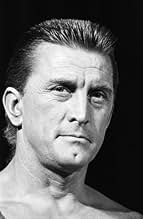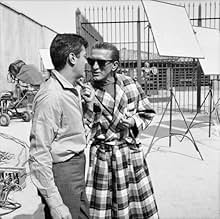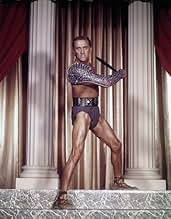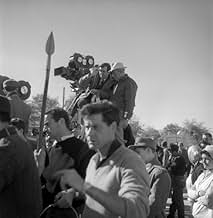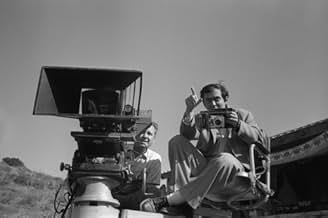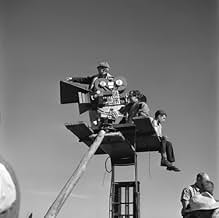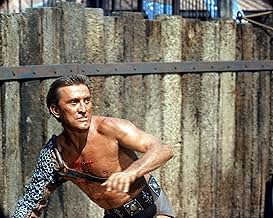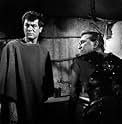El esclavo Spartacus dirige una violenta revuelta contra la decadente República Romana.El esclavo Spartacus dirige una violenta revuelta contra la decadente República Romana.El esclavo Spartacus dirige una violenta revuelta contra la decadente República Romana.
- Dirección
- Guionistas
- Elenco
- Ganó 4 premios Óscar
- 12 premios ganados y 11 nominaciones en total
Resumen
Reviewers say 'Spartacus' is lauded for its epic scale, historical drama, and standout performances by Kirk Douglas, Laurence Olivier, and Peter Ustinov. Key themes include the fight for freedom, class conflict, and human resilience. However, some criticize historical inaccuracies, pacing, and the film's length. Love scenes and certain character arcs receive mixed feedback. Despite these issues, the film's spectacle, cinematography, and ensemble cast performances are widely appreciated.
Opiniones destacadas
It is very much part of Hollywood folklore that having dispensed with the services of Anthony Mann, producer and star Kirk Douglas brought in Stanley Kubrick with whom he had worked so effectively in 'Paths of Glory'. This represented a daunting challenge and Kubrick passed with flying colours. The rest as they say is history although Douglas always felt that Kubrick was not as grateful as he should have been!
It would be well-nigh impossible now to assemble a cast of such substance and quality. There were bound to be clashes of temperament of course and the animosity between Olivier and Laughton has been amusingly recounted by Peter Ustinov who picked up an Oscar as Best Supporting actor. Olivier here is in his physical prime and is magnificent in the role of Crassus. He is ruthlessness incarnate but tender in his scenes with the Lavinia of Jean Simmons. He had previously directed her in 'Hamlet' and their professional bond is palpable.
There are scenes which are indelibly etched notably the gladiatorial combat between Douglas and Woody Strode and the scene where the slave army watches the legions of Crassus forming for battle which must surely have been inspired by Eisenstein's 'Alexander Nevsky'. The score by Alex North although harsh captures perfectly the brutality of the times whilst Russell Metty's cinematography is outstanding.
Forget the others, this is the only gladiator film that really matters and it will never be surpassed.
It would be well-nigh impossible now to assemble a cast of such substance and quality. There were bound to be clashes of temperament of course and the animosity between Olivier and Laughton has been amusingly recounted by Peter Ustinov who picked up an Oscar as Best Supporting actor. Olivier here is in his physical prime and is magnificent in the role of Crassus. He is ruthlessness incarnate but tender in his scenes with the Lavinia of Jean Simmons. He had previously directed her in 'Hamlet' and their professional bond is palpable.
There are scenes which are indelibly etched notably the gladiatorial combat between Douglas and Woody Strode and the scene where the slave army watches the legions of Crassus forming for battle which must surely have been inspired by Eisenstein's 'Alexander Nevsky'. The score by Alex North although harsh captures perfectly the brutality of the times whilst Russell Metty's cinematography is outstanding.
Forget the others, this is the only gladiator film that really matters and it will never be surpassed.
This is Kubrick's farewell to Hollywood. I would have liked to be a fly on the wall. I don't believe for a minute that it was a cordial parting of the ways. I mean, Kubrick never returned, never! With "Paths of Glory" Kubrick gave Kirk Douglas, not just his best part as an actor, but his best movie. By the time Douglas called Kubrick to "take over" "Spartacus" Douglas was already a huge star with too much saying in the matter. Look at it, it's clear. "Spartacus" is more Douglas than Kubrick. Great fun to watch, yes, absolutely. A terrific script by black listed Dalton Trumbo. Some fight sequences unequalled in the history of film. Look at the fight between Douglas and Woody Strode and compare it to the ones in "Troy" or "Gladiator" for that matter. It is sad an embarrassing to realise how low we've fallen. Computer generated images or not. The cast is unbelievable but it's clearly not Kubrick's. The casting of his movies was part of his master plan. He would cast a Ryan O'Neil as Barry Lyndon for instance so he can blend perfectly with the magnificent tapestry, without adding any colours of his own. The same can be said of Keir Dullea, in 2001, a robotic non entity in a showdown with a voice. When he needed actors to be at the very pinnacle of his universe he went to Peter Sellers, Malcolm McDowell or James Mason. Even the casting of Tom Cruise made a lot of sense. He used the star and his wife to talk about the dreamlike powers of betrayal. In "Spartacus" Tony Curtis, plays Antoninus, a teacher of the classics. A campy idea never seen in a Kubrick film, before or since. To be fair, there are some spot on, brilliant pieces of casting. Charles Laughton is, as usual, superb. Peter Ustinov, terrific. Laurence Olivier manages to give a multifaceted portrait of weakness, fear and greed. Jean Simmons makes the reason to survive totally believable. But the cutesy love scene between her and a shiny muscular, coiffed Spartacus is truly terrible. As a final blow, the scene is enveloped in a sticky, corny music theme. Having said all that. Don't you dare missing this epic. I'ts Kubrick's goodbye to Hollywood and like everything else that the master said or do, he really meant it.
I know my summary may sound opinionated...but I couldn't help being entertained by this film. If I had any complaints it would be there are one or two parts that suffer from uneven pacing and in the latter half especially there are a lot of wordy speeches from Kirk Douglas. That said, it is very well made, with sweeping cinematography, beautiful costumes and well constructed sets. The score is triumphant and bombastic, Kubrick's direction is secure and the script is surprisingly intelligent and knowing. Also the action is brilliantly done, and the performances are to be much applauded, with Kirk Douglas believable and sincere in the title role, Jean Simmons alluring as Varina and Laurence Olivier, Peter Ustinov and Charles Laughton stealing every single scene they are in.
Overall, maybe not Kubrick's very best, but a fine historical epic. 9/10 Bethany Cox
Overall, maybe not Kubrick's very best, but a fine historical epic. 9/10 Bethany Cox
From what little I've read of this film it was lucky to have been made at all. Some very big talents had some very big egos and those egos clashed repeatedly. Original director Anthony Mann was replaced by Stanley Kubrick by Producer/Star Kirk Douglas among other clashes.
But the result was all worth it. The stars all give top notch performances, but the mark of a really great film is the memorability of each individual in the ensemble. To give a few examples, Charles McGraw as the sadistic trainer at the gladiatorial school, John Dall as Sir Laurence Olivier's protégé, and John Ireland as Kirk Douglas's fellow gladiator trainee are all memorable in the brief roles they have.
Kirk Douglas wisely opts for a straightforward interpretation of a hero in the title role of Spartacus. He's a BC everyman, born into a world which hadn't heard anything about human rights, he knows and feels he's not just cattle. Catch the alternating scenes of Douglas and Sir Laurence Olivier addressing the slave army and the Roman Army. Olivier with his years of Shakespearean training coming across as the tyrant to be, and Douglas in simple prose talking about the slaves fighting for their hopes and dreams. Very effective.
The plot concerns a revolt at a gladiatorial school which mushrooms into a crisis for the Roman Empire. Political factions led by Olivier as Crassus and Charles Laughton as Gracchus seek to use the slave revolt to further their own ends.
Laughton as always is a wonder. It's a bit of unusual casting for him because his parts are usually those of very tortured souls. His Gracchus is a sly rogue, but a decent man. One of my favorite movie lines of all time is delivered by him addressing the Roman Senate where he says he'll "take a little republican corruption for a little republican freedom."
Another sly rogue in the film is Peter Ustinov who won the first of his two Oscars as Batiatus the owner of the gladiatorial school. Like so many others I'm sure in those days, he's just trying to come out on the winning side when doing so could be a life or death situation.
Jean Simmons as Varinia, beloved of Spartacus, has the only woman's part of any substance. But when was Ms. Simmons bad in anything. One of the most underrated and under-appreciated actresses in the history of film.
The lessons about man's desire for freedom and to control his own destiny are eternal and valid. And this film will be also.
But the result was all worth it. The stars all give top notch performances, but the mark of a really great film is the memorability of each individual in the ensemble. To give a few examples, Charles McGraw as the sadistic trainer at the gladiatorial school, John Dall as Sir Laurence Olivier's protégé, and John Ireland as Kirk Douglas's fellow gladiator trainee are all memorable in the brief roles they have.
Kirk Douglas wisely opts for a straightforward interpretation of a hero in the title role of Spartacus. He's a BC everyman, born into a world which hadn't heard anything about human rights, he knows and feels he's not just cattle. Catch the alternating scenes of Douglas and Sir Laurence Olivier addressing the slave army and the Roman Army. Olivier with his years of Shakespearean training coming across as the tyrant to be, and Douglas in simple prose talking about the slaves fighting for their hopes and dreams. Very effective.
The plot concerns a revolt at a gladiatorial school which mushrooms into a crisis for the Roman Empire. Political factions led by Olivier as Crassus and Charles Laughton as Gracchus seek to use the slave revolt to further their own ends.
Laughton as always is a wonder. It's a bit of unusual casting for him because his parts are usually those of very tortured souls. His Gracchus is a sly rogue, but a decent man. One of my favorite movie lines of all time is delivered by him addressing the Roman Senate where he says he'll "take a little republican corruption for a little republican freedom."
Another sly rogue in the film is Peter Ustinov who won the first of his two Oscars as Batiatus the owner of the gladiatorial school. Like so many others I'm sure in those days, he's just trying to come out on the winning side when doing so could be a life or death situation.
Jean Simmons as Varinia, beloved of Spartacus, has the only woman's part of any substance. But when was Ms. Simmons bad in anything. One of the most underrated and under-appreciated actresses in the history of film.
The lessons about man's desire for freedom and to control his own destiny are eternal and valid. And this film will be also.
Spartacus (1960) was a director for hire gig for Stanley Kubrick. Kirk Douglas was in a pinch for his next film project. He was making an epic film about a slave in the roman republic who rebels against his masters. Anthony Mann stepped down from the director's chair and Mr. Douglas needed someone to take over. Enters Stanley Kubrick. Although he has little creative input (i.e. script and story wise) he manages to make a compelling movie with his keen eye and directorial abilities.
Filmed in a grand scope and in such great detail, Spartacus is eye candy for fans of epic film making. I can only imagine what the film would have been like if he had total control over the project. Kirk Douglas is the man as Spartacus, Tony Curtis is quite good as his sidekick, Charles Laughton is wise and witty as the elder senator, Peter Ustinov is a hoot in his role as the poor victim of fortunate (and unfortunate) circumstance and Sir Laurence Olivier shows why he was the premier actor of his day as Crassus.
Highly recommended for Kirk Douglas fans and Stanley Kubrick philes.
Filmed in a grand scope and in such great detail, Spartacus is eye candy for fans of epic film making. I can only imagine what the film would have been like if he had total control over the project. Kirk Douglas is the man as Spartacus, Tony Curtis is quite good as his sidekick, Charles Laughton is wise and witty as the elder senator, Peter Ustinov is a hoot in his role as the poor victim of fortunate (and unfortunate) circumstance and Sir Laurence Olivier shows why he was the premier actor of his day as Crassus.
Highly recommended for Kirk Douglas fans and Stanley Kubrick philes.
¿Sabías que…?
- TriviaStanley Kubrick was brought in as director after Kirk Douglas had a major falling out with the original director, Anthony Mann. According to Sir Peter Ustinov, the salt mines sequence was the only footage shot by Mann.
- ErroresA truck drives along the hills behind a battle scene.
- Citas
Herald: I bring a message from your master, Marcus Licinius Crassus, Commander of Italy. By command of His Most Merciful Excellency, your lives are to be spared. Slaves you were and slaves you remain. But the terrible penalty of crucifixion has been set aside on the single condition that you identify the body or the living person of the slave called Spartacus.
Antoninus: [stands up] I'm Spartacus!
[everyone around Antoninus and Spartacus stands up and shouts "I'm Spartacus!"]
- Créditos curiososThe six main cast members are accompanied by an item that represents their character (a chain, a Roman eagle, a wine jug, a couple of hands - one wielding a snake, and a sword).
- Versiones alternativasAfter its premiere the film was heavily cut and wasn't shown in its complete form until 1991, when a restored version was re-released. Among the restored scenes is one where where Marcus Crassus (Laurence Olivier) tries to seduce Antonius (Tony Curtis) in the bath. The soundtrack was damaged, so Anthony Hopkins was called in to dub Olivier's lines. In addition, several scenes of violence preview audiences reacted to negatively were restored, including Crassus bloodily stabbing Draba, Marcellus being drowned in the stew, Spartacus stabbing a Roman soldier in the pool, and several gory shots in the final battle, notably Spartacus lopping off the arm of a Roman soldier.
- ConexionesEdited into Hércules: Los viajes legendarios: Les Contemptibles (1997)
Selecciones populares
Inicia sesión para calificar y agrega a la lista de videos para obtener recomendaciones personalizadas
Detalles
- Fecha de lanzamiento
- País de origen
- Sitio oficial
- Idioma
- También se conoce como
- Spartacus
- Locaciones de filmación
- Hearst Castle, San Simeon, California, Estados Unidos(Crassus' villa)
- Productora
- Ver más créditos de la compañía en IMDbPro
Taquilla
- Presupuesto
- USD 12,000,000 (estimado)
- Total en EE. UU. y Canadá
- USD 1,830,650
- Fin de semana de estreno en EE. UU. y Canadá
- USD 92,162
- 28 abr 1991
- Total a nivel mundial
- USD 1,855,491
- Tiempo de ejecución
- 3h 17min(197 min)
- Color
Contribuir a esta página
Sugiere una edición o agrega el contenido que falta




